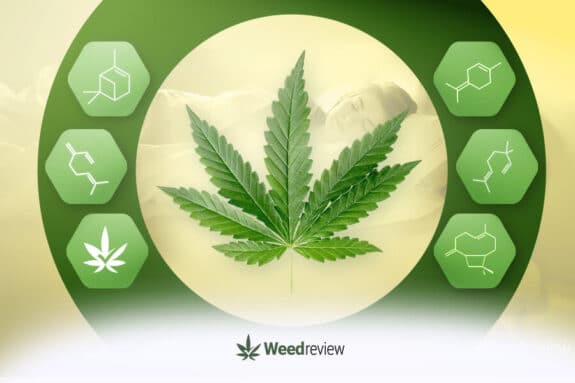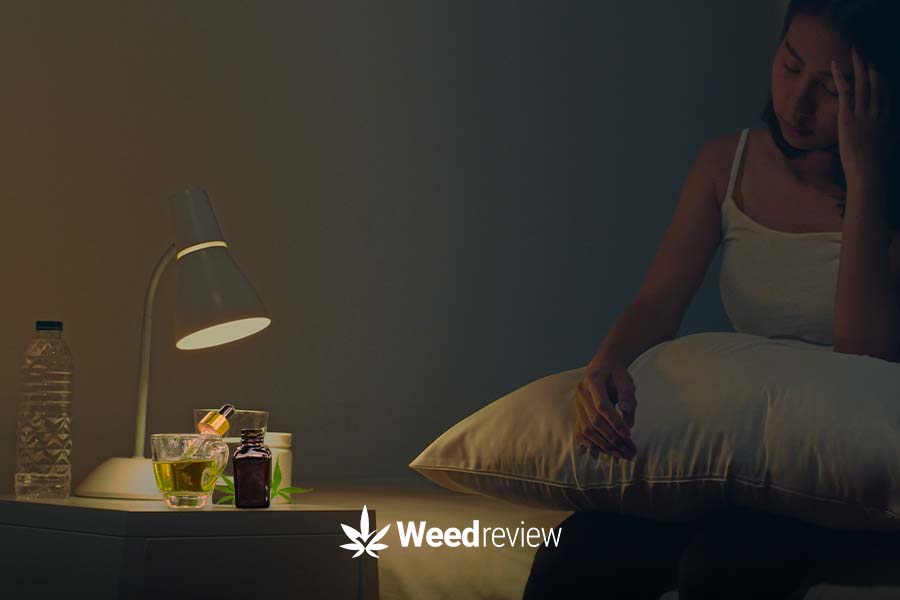
Cannabis & Melatonin: Is it Safe to Mix THC with Melatonin for Sleep?

Table of Contents
Cannabis plant and melatonin hormone are two different substances, yet both affect sleep.
Many people take marijuana to ease their insomnia and sleep better. Similarly, melatonin is available over the counter as a sleep aid. So, seeing people use these sleep remedies together is not surprising.
The question is can you mix it with melatonin? Is it safe?
The short answer is it depends on the person. It can be safe to do it in moderation, but making it a habit can be bad for your natural sleep cycle.
This article will explore this relationship in detail. We will help paint a clearer picture of how cannabis and melatonin work together and guide you towards using the two responsibly.
What is melatonin?
Melatonin is a hormone naturally produced by our bodies.
The pineal gland, a small, pea-sized gland in the middle of the brain, makes the hormone. While it’s most commonly associated with sleep, melatonin also regulates our internal body clock, known as the circadian rhythm.
How does it help sleep?
Melatonin tells your body it is time to relax and prepare for sleep, depending on the light.
Our bodies naturally understand when it’s time to be awake and when it’s time to sleep. During the day, when we see the sunlight, our brain knows it’s daytime and keeps us awake and alert. But in the evening, when we see red lights (like during sunsets), our brain releases melatonin to help us sleep.
The hormone doesn’t knock you out like a sleeping pill; it pushes the body towards sleep, encouraging a natural transition to rest. The more melatonin your body has, the more sleepy you will feel.
Melatonin’s production is at its highest at night and lowest during the day.
Aside from regulating our sleep-wake cycle, melatonin is involved in the following bodily processes:
- Body temperature regulation: Melatonin assists in regulating body temperature, contributing to the slight drop in core temperature that typically coincides with the start of sleepiness.
- Antioxidant properties: Melatonin has antioxidant effects that help protect our cells from oxidative damage, which can contribute to overall health and well-being.
- Immune system function: Research suggests melatonin can influence immune system function, potentially offering protective effects.
- Cardiovascular health: Melatonin is believed to play a part in cardiovascular health, although the exact mechanisms are still being explored.
- Mood regulation: Some studies indicate that melatonin may have an impact on mood regulation, although further research is needed in this area.
Who should use melatonin?
Melatonin supplements can be helpful for people who struggle to sleep well due to modern lifestyles. It can help people who:
- Struggle with sleep disorders, including insomnia and delayed sleep phase syndrome.
- Work night shifts so that they can sleep better during the day.
- Travel across different time zones as it can help prevent jet lag.
- Ageing adults as the body’s natural melatonin production may slow down with time.
Before electricity and modern homes, our bodies relied on natural light for most of our activities. This meant melatonin was released right when it should – in the night – and reduced in the morning.
But now, with artificial lights and screens, our bodies can get confused. We might stay awake too late because of the blue light from our phones and computers, which tricks our brains into thinking it is still daytime. This means no melatonin, even though it is night.
How does marijuana help sleep?
Cannabis has a long history of being used as a sleep supplement. Research shows that weed can impact sleep in the following ways:
- Fall asleep faster: Cannabis might help reduce the time it takes to fall asleep, also known as sleep latency. This can be beneficial for people who struggle with insomnia or trouble falling asleep.
- More time in deep sleep: Some research suggests cannabis can increase the time spent in the deep sleep stage, a critical phase for rest and recovery.
- Less REM sleep: Cannabis may decrease REM sleep, the stage in which most dreaming occurs. This can lead to fewer dreams and nightmares, which could benefit those suffering from PTSD-related nightmares.
- Better sleep quality: By easing conditions that interfere with sleep, such as pain or anxiety, cannabis can indirectly improve overall sleep quality.
At this point, it is important to note that cannabis’s two main compounds – THC (tetrahydrocannabinol) and CBD (cannabidiol) – affect sleep cycles differently.
THC is what gets you high when you take weed. While it does help greatly with sleep, it has also been shown to impact sleep architecture with long-term use and lead to dependence and withdrawal.
CBD, meanwhile, is non-psychoactive, non-addictive, and considered to be safe in all doses. CBD’s effects on sleep do not seem as potent as THC’s, but it has shown potential in promoting good sleep patterns.
What happens when you mix melatonin & marijuana?
Combining melatonin and marijuana can be seen as a holistic attempt to manage sleep issues. If you take it responsibly, it should not be much of a problem.
However, the mix will affect your circadian rhythms and sleep architecture if you use the two in large doses without serious thought. This is not good for your sleep cycle in the long run.

The interaction between the two is complex and needs to be fully understood, deserving a cautious approach. Here is what you need to know:
Increased sleep & sedation
Marijuana prompts the production of melatonin in your brain. Combined with external melatonin, this could improve sleep for some people, particularly those with severe insomnia or other sleep disorders.
Increased drowsiness
Cannabis and melatonin both make you sleepy. Naturally, their higher levels in your system can cause excessive sleepiness, nausea, or grogginess when you wake up.
Increased closed-eye hallucinations
Weed makes you dream less as it reduces REM sleep. Melatonin, on the other hand, increases REM sleep and can cause vivid, intense dreams. This is because melatonin releases a protein called vasotocin that regulates REM sleep.
Taking two together can disrupt your REM cycle and lead to hallucinations while you sleep. The full extent of this dynamic is still being studied.
That said, it is only natural to assume that when you take two substances that have contrasting effects on your dreams, the result can be unpredictable.
In short, taking melatonin & cannabis together means more sleep. This comes at the expense of possibly feeling tired, lethargic, drowsy, and having vivid dreams.
How much melatonin should you take?
The recommended dosage of melatonin ranges from 0.5 mg to 5 mg for adults.
Finding the right melatonin dose can be tricky as it depends on individual factors like age, sleep issues, and overall health.
A general recommendation for adults is to start with a low dose, typically around 0.5 to 1 mg, taken roughly 1-2 hours before bedtime.
If sleep issues persist, increase the dosage gradually, but do not exceed the 5 mg dose without talking to your doctor first.
Taking melatonin with CBD
On its own, cannabidiol does not affect sleep as dramatically as THC does. When paired with melatonin, CBD could potentially offer several sleep-related benefits.
The intensity of sedation and sleepiness may not be as evident as with THC. It will still help you sleep better, but outcomes like intense dreams, grogginess, or fatigue may be absent with CBD.
Moreover, CBD has a good safety profile. While it has side effects, they are not as intense as with THC. That is why many people tap into the medical benefits of marijuana by focusing on cannabidiol.
This is also why many brands sell melatonin supplements with CBD instead of THC in it.
Side effects of cannabis & melatonin
Marijuana has side effects to it, as does melatonin. When you take the two substances together, you may experience the following:
- Dizziness
- Nausea
- Headache
- Drowsiness or grogginess upon waking
- Vivid dreams or nightmares
- Minor changes in blood pressure
- Daytime sleepiness if taken in high doses
As with any substance, the effects of combining melatonin and marijuana will vary among people. Not everyone may experience these side effects.
Everyone’s system is unique and will interact with marijuana differently. Factors like age, dosage, overall health, tolerance to cannabis, and the presence of any sleep disorders can all influence how a person will respond to this combination.
Best practices for taking melatonin and weed together
If you’re thinking of using melatonin and cannabis for sleep aid, do the following for best results:
- Speak to your doctor: Always consult with your doctor before mixing weed with any medicine – including melatonin. They can provide personalised advice based on your health history and current medications.
- Start with low doses: Begin with low doses of both melatonin and cannabis to see how your body reacts. Gradually adjust as necessary, keeping in mind that less is often more with both substances.
- Monitor your reaction: Pay close attention to how the combination affects you. Keep track of any changes in your sleep patterns, mood, or overall well-being. Stop using the products and talk to your doctor if you notice any adverse reactions.
- Maintain good sleep hygiene: Using melatonin and cannabis should complement, not replace, good sleep hygiene practices. This includes maintaining a regular sleep schedule, creating a sleep-friendly environment, and avoiding screens and caffeine before bedtime.
- Use high-quality products: Ensure that the cannabis and melatonin products you use are high-quality. Look for reputable brands, check for third-party testing, and opt for organic, pesticide-free cannabis when possible.
Conclusion
While the combination of melatonin and cannabis might help some people sleep better, it’s not a one-size-fits-all solution. It is best to speak to your doctor before starting this journey.
When taken as a way to support your sleep routine and get the sleep cycle back on track, it can be a good thing. However, using it daily in large quantities can lead to opposite results and negatively affect your sleep architecture.
Research is still ongoing on how marijuana and melatonin work together on your body. In addition, personal responses will vary, and you must be mindful of how this combination affects you.
Remember, good sleep isn’t just about the right supplement or medication; it’s also about maintaining healthy sleep habits and addressing underlying issues that might interfere with your sleep.


